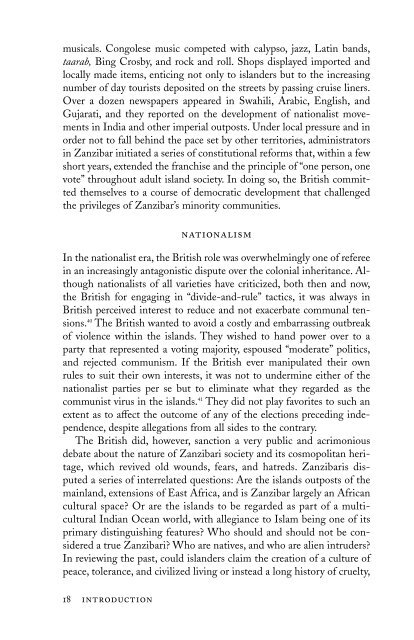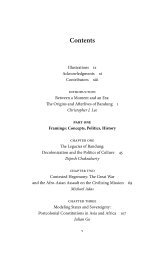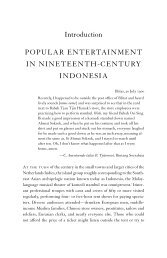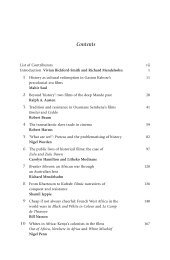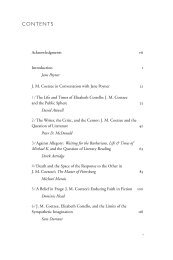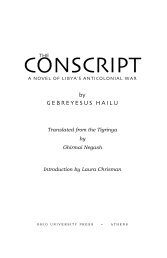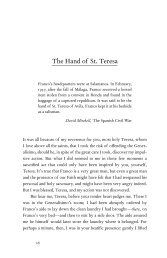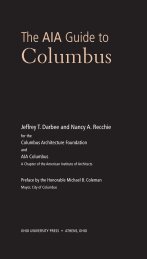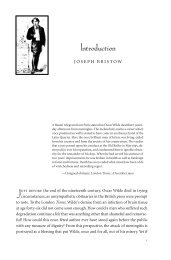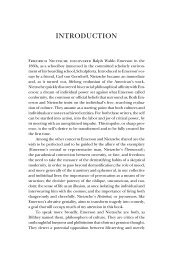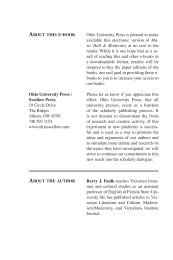Race, Revolution, and the Struggle for Human Rights in Zanzibar ...
Race, Revolution, and the Struggle for Human Rights in Zanzibar ...
Race, Revolution, and the Struggle for Human Rights in Zanzibar ...
Create successful ePaper yourself
Turn your PDF publications into a flip-book with our unique Google optimized e-Paper software.
musicals. Congolese music competed with calypso, jazz, Lat<strong>in</strong> b<strong>and</strong>s,<br />
taarab, B<strong>in</strong>g Crosby, <strong>and</strong> rock <strong>and</strong> roll. Shops displayed imported <strong>and</strong><br />
locally made items, entic<strong>in</strong>g not only to isl<strong>and</strong>ers but to <strong>the</strong> <strong>in</strong>creas<strong>in</strong>g<br />
number of day tourists deposited on <strong>the</strong> streets by pass<strong>in</strong>g cruise l<strong>in</strong>ers.<br />
Over a dozen newspapers appeared <strong>in</strong> Swahili, Arabic, English, <strong>and</strong><br />
Gujarati, <strong>and</strong> <strong>the</strong>y reported on <strong>the</strong> development of nationalist movements<br />
<strong>in</strong> India <strong>and</strong> o<strong>the</strong>r imperial outposts. Under local pressure <strong>and</strong> <strong>in</strong><br />
order not to fall beh<strong>in</strong>d <strong>the</strong> pace set by o<strong>the</strong>r territories, adm<strong>in</strong>istrators<br />
<strong>in</strong> <strong>Zanzibar</strong> <strong>in</strong>itiated a series of constitutional re<strong>for</strong>ms that, with<strong>in</strong> a few<br />
short years, extended <strong>the</strong> franchise <strong>and</strong> <strong>the</strong> pr<strong>in</strong>ciple of “one person, one<br />
vote” throughout adult isl<strong>and</strong> society. In do<strong>in</strong>g so, <strong>the</strong> British committed<br />
<strong>the</strong>mselves to a course of democratic development that challenged<br />
<strong>the</strong> privileges of <strong>Zanzibar</strong>’s m<strong>in</strong>ority communities.<br />
nationalism<br />
In <strong>the</strong> nationalist era, <strong>the</strong> British role was overwhelm<strong>in</strong>gly one of referee<br />
<strong>in</strong> an <strong>in</strong>creas<strong>in</strong>gly antagonistic dispute over <strong>the</strong> colonial <strong>in</strong>heritance. Although<br />
nationalists of all varieties have criticized, both <strong>the</strong>n <strong>and</strong> now,<br />
<strong>the</strong> British <strong>for</strong> engag<strong>in</strong>g <strong>in</strong> “divide-<strong>and</strong>-rule” tactics, it was always <strong>in</strong><br />
British perceived <strong>in</strong>terest to reduce <strong>and</strong> not exacerbate communal tensions.<br />
40 The British wanted to avoid a costly <strong>and</strong> embarrass<strong>in</strong>g outbreak<br />
of violence with<strong>in</strong> <strong>the</strong> isl<strong>and</strong>s. They wished to h<strong>and</strong> power over to a<br />
party that represented a vot<strong>in</strong>g majority, espoused “moderate” politics,<br />
<strong>and</strong> rejected communism. If <strong>the</strong> British ever manipulated <strong>the</strong>ir own<br />
rules to suit <strong>the</strong>ir own <strong>in</strong>terests, it was not to underm<strong>in</strong>e ei<strong>the</strong>r of <strong>the</strong><br />
nationalist parties per se but to elim<strong>in</strong>ate what <strong>the</strong>y regarded as <strong>the</strong><br />
communist virus <strong>in</strong> <strong>the</strong> isl<strong>and</strong>s. 41 They did not play favorites to such an<br />
extent as to affect <strong>the</strong> outcome of any of <strong>the</strong> elections preced<strong>in</strong>g <strong>in</strong>dependence,<br />
despite allegations from all sides to <strong>the</strong> contrary.<br />
The British did, however, sanction a very public <strong>and</strong> acrimonious<br />
debate about <strong>the</strong> nature of <strong>Zanzibar</strong>i society <strong>and</strong> its cosmopolitan heritage,<br />
which revived old wounds, fears, <strong>and</strong> hatreds. <strong>Zanzibar</strong>is disputed<br />
a series of <strong>in</strong>terrelated questions: Are <strong>the</strong> isl<strong>and</strong>s outposts of <strong>the</strong><br />
ma<strong>in</strong>l<strong>and</strong>, extensions of East Africa, <strong>and</strong> is <strong>Zanzibar</strong> largely an African<br />
cultural space? Or are <strong>the</strong> isl<strong>and</strong>s to be regarded as part of a multicultural<br />
Indian Ocean world, with allegiance to Islam be<strong>in</strong>g one of its<br />
primary dist<strong>in</strong>guish<strong>in</strong>g features? Who should <strong>and</strong> should not be considered<br />
a true <strong>Zanzibar</strong>i? Who are natives, <strong>and</strong> who are alien <strong>in</strong>truders?<br />
In review<strong>in</strong>g <strong>the</strong> past, could isl<strong>and</strong>ers claim <strong>the</strong> creation of a culture of<br />
peace, tolerance, <strong>and</strong> civilized liv<strong>in</strong>g or <strong>in</strong>stead a long history of cruelty,<br />
18 <strong>in</strong>troduction


